Badaga language not a dialect of Kannada, claims French linguistic scholar
According to her research paper published recently in the Encyclopedia of Nilgiris, edited by international anthropologist Paul Hockings, a professor in the United States, there are evident, but isolated and non-systematic coincidences between Badaga and Alu Kurumba.
Hence, the four traditional communities of the Nilgiris, Todas, Kotas, Alu Kurumbas and Badagas retain their morphology and categorical distinctions, some very archaic features, which give them an overall grammatical homogeneity, according to her. It is evident from her research that the Badaga community was created in the Nilgiris with small local groups in ancient times. LACITO in Paris houses numerous varieties of Badaga stories and songs collected over the past two decades by Pilot-Raichoor.
Rev P K Mulley, a clergyman of CSI in Kotagiri, and a freelance investigator of the Nilgiris for more than three decades, said that even before Pilot-Raichoor could arrive at it, he always knew that the Badaga community evolved from the Nilgiris. The retroflex sounds of the Badaga language are unique, he said. This uniqueness has been authenticated in the book ‘Sounds of the World’s Languages,’ published in 1996. Mulley also stresses for ‘palato-graphic’ investigation and audio recording of the sounds of the language.
Endangering Badaga?
Dr.R.K.Haldorai
Nilgiri plateau is the abode of more than five major tribes and who are basically of Dravidian stock. They are the speakers of the Dravidian family of languages and most of the languages are mutually unintelligible. Badaga, the language of the larger population among the tribes of the Nilgiris served as a lingua franca since unknown period. That is, even the other ethnic tribes of the Nilgiri hills used to converse with others in Badaga language. But, eventually the Badaga population was not big at any point of time. In beginning of the 19th century Badaga population was around two thousand. Badagas lived in the Nilgiri hills since hundreds of years and were scattered throughout the plateau. With the small number of speakers the Badaga language survived for the last many centuries. Instead of saying survived, we can say it developed into a stronger position and its usage spread into more domains. While the Badaga language preserved more of its archaic features it developed its own special characters too. Usages of the Badaga and its lingua franca status of the Nilgiri district were well maintained up to the middle of the twentieth century. Now the population of Badagas increased into many fold. With increased population one can expect a stronger Badaga language with more number of speakers. But, now to our dismay the UNESCO categorised Badaga as one of the endangered languages. That too it kept Badaga’s status as definitely endangered position, the second of the four endangered levels.
Losing one’s own language is nothing but losing one’s social identity. Language is an expression of cultural identity and a medium of intelligibility. Language is like key that can unlock local knowledge about medicinal secrets, ecological wisdom, weather and climate pattern, spiritual attitude etc. Of course, the pity is that most of the present Badagas still do not sense the eroding phase of their mother tongue. This is a serious matter and it is a socio-cultural shock for language enthusiast. In the subject of endangered language, language shift and language loss are the two main topics of discussion among linguists and educationists. Language shift is nothing but switching over from one language to another. It occurs only where bilingualism exists and a dominant language is used in most domains instead of mother tongue.
Bilingualism among tribal communities is higher than among the general population. Exception to this general perception, it is interesting to note that Badagas still have not attained the full fledged bilingual status. Still many elders’ second language skill, particularly elder women’s Tamil spoken skill is so poor. It is to be noted that the predominantly used functional domains of Badaga language has not eroded. As majority of the Badagas live in hamlets where the sway of Badaga language is more or less intact. At the same time it miserably failed to get the usage position in newly created language domains. Medium of education and the administrative status of Tamil made Badagas bilinguals to some extent. These are the two important newly created language domains. The influence of media is also so strong. In the same way, the prestigious status of English dominated in using more English words. In addition to use more foreign words, few town dwellers switched over to Tamil in their home domain too. Socially it is a negative trend to keep their mother tongue alive. However, to our surprise majority of these people, especially children are not missed to learn Badaga and they use instantly whenever situation warrants.
Multilingualism is a fundamental value in today’s world and it became a world order for major population. So, people should understand that using mother tongue is no way jeopardising their learning of other languages. Instead it facilitates to learn second language and so. Fortunately for Badagas the second language, Tamil is so related to their mother tongue. So normally, it is relatively easy to learn Tamil. Tamil and Badaga belong to Dravidian family and they have many common properties. A proper analytical work will facilitate to understand the similarities and relationship they have. Most of the written communication goes not with the Badaga language. By making Badaga a lettered language we can create rooms for more usages. At the present social scenario, it seems proper to use Tamil and Roman (English) letters. Writing grammars and associated materials are fundamental to make a language written one. Collecting of vocabularies as much as possible is the utmost importance.
In 1999 UNESCO declared 21st February as international Mother Language day. This is to create awareness about the importance of mother tongue. Globally it is estimated, more than 7000 living language are there and the world body favours not to lose any single language. Many useful programmers are advocated to arrest the language loss. Most of the people have a sentimental attachment for the place where they brought up and their mother tongue. For Badagas the Nilgiri plateau and Badaga language are synonyms. Normally they do not suffer any social stigma. Instead they feel proud of being Badaga. As the ground reality is so, their attachment to mother tongue must be so intimate. No doubt that the people who converse in align language with their fellow tribes’ men will switch over to mother tongue at once when they understand the importance of the mother tongue. So we need awareness programmes to instil the importance of mother tongue.
For survival of a language land holding is considered as necessary ingredients. Badagas are losing their land holdings considerably. Of course this will create a negative trend. Even while pursuing our economic growth we need to do a lot to preserve the rich treasures of our culture and civilisation.
Hindi is the official and not the national language of the union. English is the associate language.
Tamil is the official language of Tamil Nadu. Articles 343 – 351 of part xvii and the 8th Schedule deal with issues of languages of our country. In our nation there are twenty two scheduled languages and Badaga is a non scheduled language. In India not a single state is completely monolingual and almost every child speaks at least two languages. Article 30 of our constitution guarantees minorities the right to develop and propagate their languages. Language shift and language loss are the world wide phenomena. These are the few points should be known while planning for preservation of a language like Badaga. So, in addition to mother tongue, with Tamil and English a Badaga can proceed his day to day affair without any major hurdle
Language is the preserver of culture and that one’s mother tongue is precious. One may learn as many as languages he can. But don’t forget to learn your mother tongue properly. It is inevitable to learn Tamil and English in the present social scenario. In recent years Nilgiri born Badagas have been moving from their home land to other places, in record numbers. Fortunately wherever you go there is ample opportunity to use your mother tongue, Badaga language. Thanks to the modern technology which are giving vast opportunity to use mother tongue. For example mobile phone, which became an integral part of modern men, is much helpful conversing in one’s mother tongue. Anyhow, mother tongue is so important to maintain cultural entities and ethnic identity. Many a tribe has been engulfed by the surrounding environment. The Badagas, too, cannot remain unscathed. Only time will tell if they can make the necessary adaptation to preserve their identity.
Anand [devanand.tr@247customer.com] comments
Two points. 1) It is not correct to say that ‘Badagas are Kannadigas who got migrated from Mysore region in 1600 AD‘. See the pages on Badaga Origin.2) There is no denying the fact that Badaga resembles halaya Kannada to a large extent. Or is it possible that Kannada resembles Badaga to a large extent? Half full or half empty?? – Wg Cdr JP
|:|:|:|:|:|:|:|
I came across another book on Badaga by Jakkanaarai SIVAJI RAMAN. The book is in Tamil and titled ‘படுக சமுதாயம் [Badaga Samudhayam] – Badaga Community.
One of the most interesting information Sivaji Raman conveys in his book is that Badaga language finds extensive mention in old – purana – Tamil literature like ” Tholkaappiam” where it is clearly mentioned that Badaga was a separate language spoken in a northern nation to Tamil nadu called ‘VADAGAM [Badaga]‘, the other ‘countries’ being Karnadagam [Kannada], Konganam [Konkani], Kudagam [Coorgi], Thuluvam [Thulu], Telingam [Telugu] and Kalingam [Oriya]. He goes on to quote a few verses where ‘vadaga’ is mentioned. He is of the opinion that Badaga can be traced back to 2300 years.
Sivaji Raman laments :
‘ படுக மொழி தற்பொழுது படிப்பு, தொழில் ஆகியவற்றில் தமிழ் மற்றும் ஆங்கிலத்தின் தாக்கம் காரணமாக மிகவும் மாறுபட்டு பேசப்படுகிறது. தூய படுகு தெரிந்தவர்களே இல்லை என்றாகிவிட்டது. இது படுக மொழியில் சொல் பஞ்ச்சத்தால் ஏற்பட்டதன்று. படுக மொழியின் ஏராளமான சொற்கள் மறக்கப்பட்டு மறைந்து விட்டன. இதற்கு காரணம் படுகு மொழிக்கு வரிவடிவம் இல்லாததேயாகும்’
( Badaga is spoken very differently due to the influence by Tamil and English on education and profession. It appears that there are none who know ‘PURE’ Badaga. This is not due to lack of words in Badaga. Lot of Badaga words have been forgotten [due to the influence of Tamil and English] and hence become extinct. The reason for this is that BADAGA language DOES NOT HAVE A SCRIPT).
I totally agree with him.
|~|~|~|~|~|~|
Badaga Language – Did it predate Kannada?
Read the complete article with much more interesting info about Badaga Language here
Badaga language Totally Explained
For thoughts on
Badaga Barae – Badaga Script
*****************
Came across the following interesting website by by Peter and Jenny Ladefoged in http://www.phonetics.ucla.edu/index.html
Discover more from Badagas of the Blue Mountains
Subscribe to get the latest posts to your email.

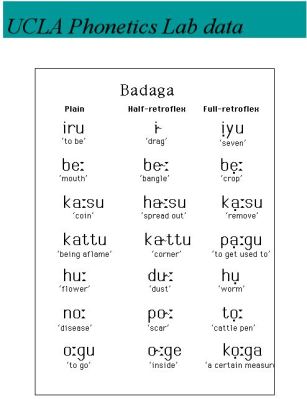
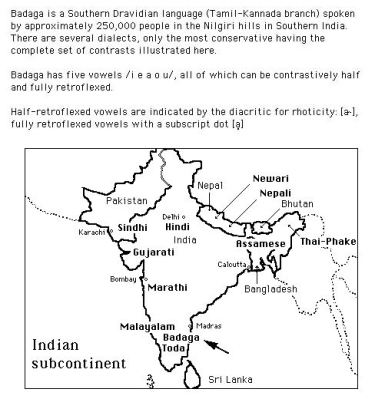









 Mookuthi
Mookuthi  Chinna
Chinna 






 ==
==

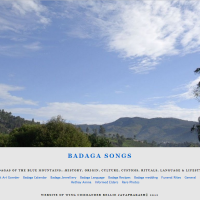
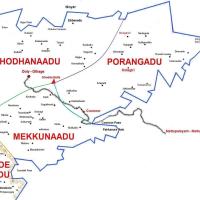

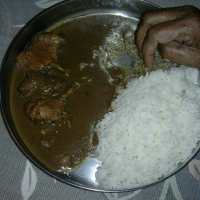








































What do you say hotness in badaga language ?
Well, if you are referring to “temperature” then.
Soodu – hot
Appara soodu – very hot
Ubbakke – Warm
LikeLike
How to say sorry in badaga?
LikeLike
Thank you for your very helpful info.
Could you please share the writing in badaga for ” naa ninna priya maadilay” – I love you?
LikeLike
How to say -” I love you in Badaga “?
LikeLike
What is the word for ‘kiss’ in Badaga?
LikeLike
I’ve recently started a blog, the information you provide on this website has helped me greatly. Thank you for all of your time & work.
LikeLike
I am from Sathyamangalam… very much fond of badaga and badaga language and songs. in order to learn all these i need a guru cum close friend. can i get any one like that, who can be my guru and as well as my dear and close friend?
LikeLike
Hello Sir, How are you ? after a long time. I was pleased with the appearance of the site now and it looks great and appealing. Badaga people should join together to form a Badaga Sakithya Academy to preserve their language, culture and also Nilgiris on the whole. I saw in news many bad people building concrete buildings in nilgiris and destroying it and its beauty. People of Nilgiris and Tamil Nadu govt. should do something to preserve the beauty and nature of nilgiris. Any how. I just want to say hi to all badaga friens here. See you soon
LikeLike
Hi Sir, After a long time am back. to see you have did a lot of changes to the appearance of this site but the colours are so dark and not appealing to eyes… if you want some premium themes for wordpress for free of cost. if you would like to do a webdesign or upload the theme or send the theme to your site….. pls do email me…. i want to help you to make this site look much appealing sir…
LikeLike
How do I wish a girl in Badaga saying 1) “wish you happy birthday, 2)you look beautiful
LikeLike
I was wondering someone might be able to tell me how one would say “I love you” in Badaga.
LikeLike
Now only i came to know all months in badaga language…..Marvellous…..
PRABU. M
Ajjoor.
LikeLike
can u confirm if the dialects published in your website does exist, because being a badaga I felt that we do not have any dialect and our language is from Kanada please reply
JP adds – The origin of Badaga – both the people and language – is still a mystery and no conclusive proof has been given/ found so far. Though it is an undisputable fact that Badaga and kannada are closely linked, my gut feeling is BADAGA IS A SEPARATE DRAVIDIAN LANGUAGE.
LikeLike
Could you translate this for me? hope its right.. been years since i heard it..iga enandare idudhadaiya ille idupiliye.
LikeLike
i like badaga
i am also badaga
i am from idduhatty village
LikeLike
Recently visited your Badaga tradition and language blog. I was completely awestruck by the history, origin ,culture, customs, rituals, language and lifestyle.
I need your help in knowing more about the tradition, culture and about the language. Do u have any websites or recommended books to learn Badaga language.
LikeLike
its really amazing to see such sort of a special website for de badagas……………………………………..
LikeLike
I AM BADUGA , RECENTLY I VISITED YOUR SITE AND KNOWN ABOUT MONTHS . THANKS FOR THE OPPORTUNITY
LikeLike
super analysis, proud to find a language/dialect so similar to kannada, was never aware of it, now i know why so many speak kannada in ooty 🙂
LikeLike
Nagulan Joghee’s choice of some of the proverbs quoted by Prof.Paul Hockings in his book on ‘Badaga proverbs , curses and Omens’ with English meaning :
Badaga Proverbs:
“Akka iddale baava ; rokka iddale sule
Okkuva hana hattale Urella nattu”
If (only) you have an elder sister, there is a sister’s husband;
If you have cash you have a kiln ( or prostitute);
If you have lots of cash , the whole village is related to you.
= = = = = = = = = = = = = = = = = = = = = = = = = = = = = = = = = = = =
“Hetta hotte ondaleyu huttu bere buddi bere”
The stomach that has given birth [to various people] is one;
[they are of] different sense and different complexion
= = = = = = = = = = = = = = = = = = = = = = = = = = = = = = = = = = = =
“Nega evalikkile , ne baluga evalikkira”
If you give order to a dog, it will give order to its tail
= = = = = = = = = = = = = = = = = = = = = = = = = = = = = = = = = = = =
“Kall aduvane ne ille ; ne ibbane kallille”
When the stone is there , there is no dog; when there is a dog there is no stone
= = = = = = = = = = = = = = = = = = = = = = = = = = = = = = = = = = = =
“Tekkana illada teru nadeya ; badakanillade bandi nadeya”
A chariot won’t move without its wheel; A cart won’t move without the driver
= = = = = = = = = = = = = = = = = = = = = = = = = = = = = = = = = = = =
“ Uppillada uta holla; kavalillada kote holla”
Food without salt is bad; and a fortress without a guard is bad
= = = = = = = = = = = = = = = = = = = = = = = = = = = = = = = = = = = =
“Saranana gunava maranado: nodu”
The nature of the greeting gesture is seen in the death
= = = = = = = = = = = = = = = = = = = = = = = = = = = = = = = = = = = =
“Ennega ele:ru kattuvaduna , hada nodi onderu kattu”\
Instead of tying seven[oxen] to the millpole[for pressing oil];
Tie one[pair] to plough the dampened soil
= = = = = = = = = = = = = = = = = = = = = = = = = = = = = = = = = = = =
“Ondu kanasuno: bagarava:
With one dream will dawn come?
= = = = = = = = = = = = = = = = = = = = = = = = = = = = = = = = = = = =
“Mane muridale kattaku; Mana muridale kattoga”
If the house breaks you can rebuild it ; if the heart breaks you cannot repair it
= = = = = = = = = = = = = = = = = = = = = = = = = = = = = = = = = = = =
“Kalaga takkada kola ; desaga takkada base”
[Place the] ornamentation at the appropriate time;
[Speak the] language appropriate to the linguistic area
= = = = = = = = = = = = = = = = = = = = = = = = = = = = = = = = = = = =
“Ondu tatte budda guiga handi endaleyu buva”
Even a pig , having once fallen once into that pit, won’t fall into the same pit again
= = = = = = = = = = = = = = = = = = = = = = = = = = = = = = = = = = = =
“Ondu kopado: hallaga buddale, ombattu kopado:geyu ebbagugaga”
If in single anger[you have] drowned in a lake, you can’t come up again with nine[times that] anger
= = = = = = = = = = = = = = = = = = = = = = = = = = = = = = = = = = = =
LikeLike
Wonderful collections & presentation. Going through such articles brings a sort of nostalgic feeling for people like me who are destined to be away from Nilgiris for one reason or the other. Anyway , it is all amazingly enjoyable and you deserve the credit for that.
LikeLike
Great Collections….
LikeLike